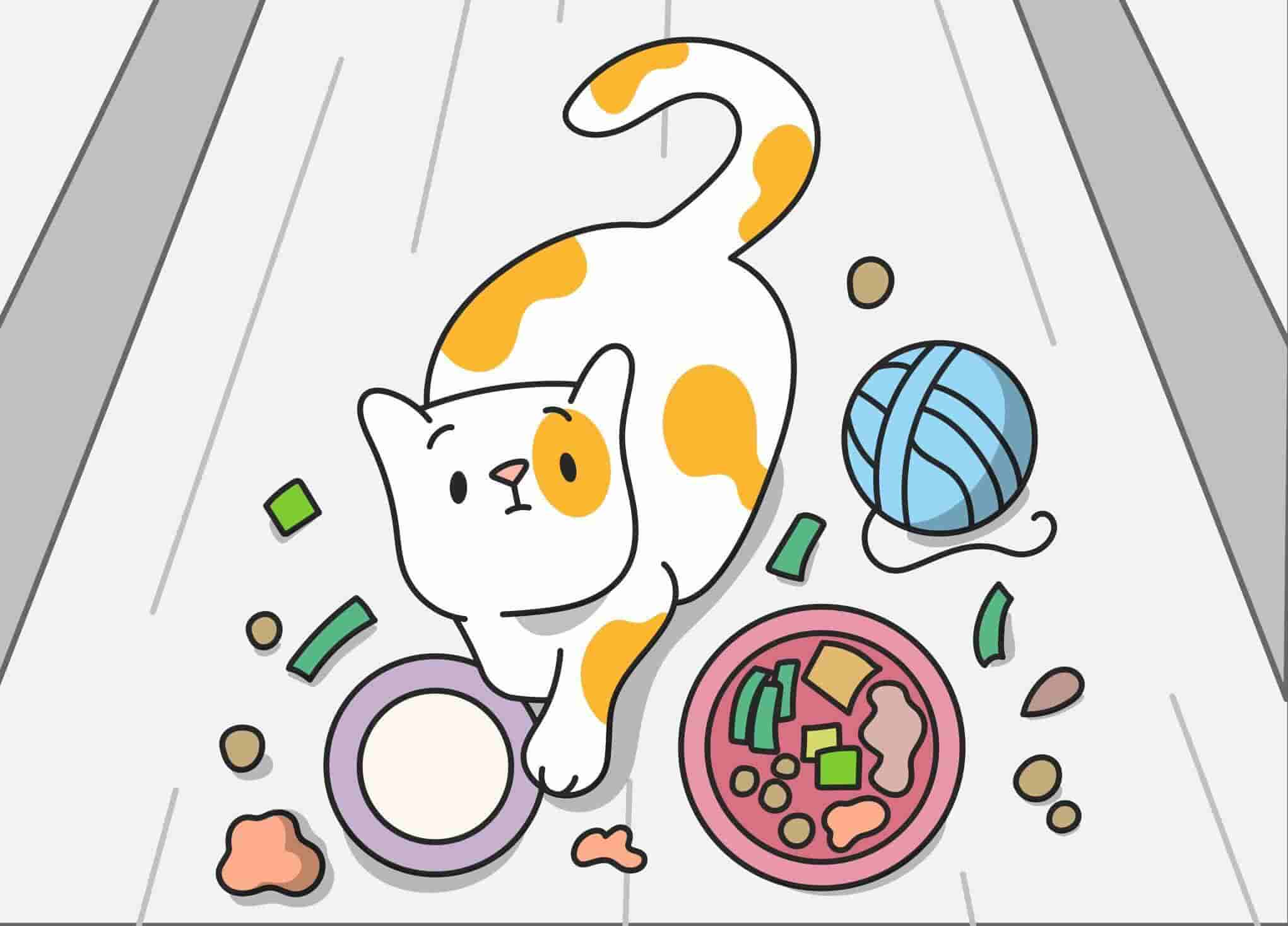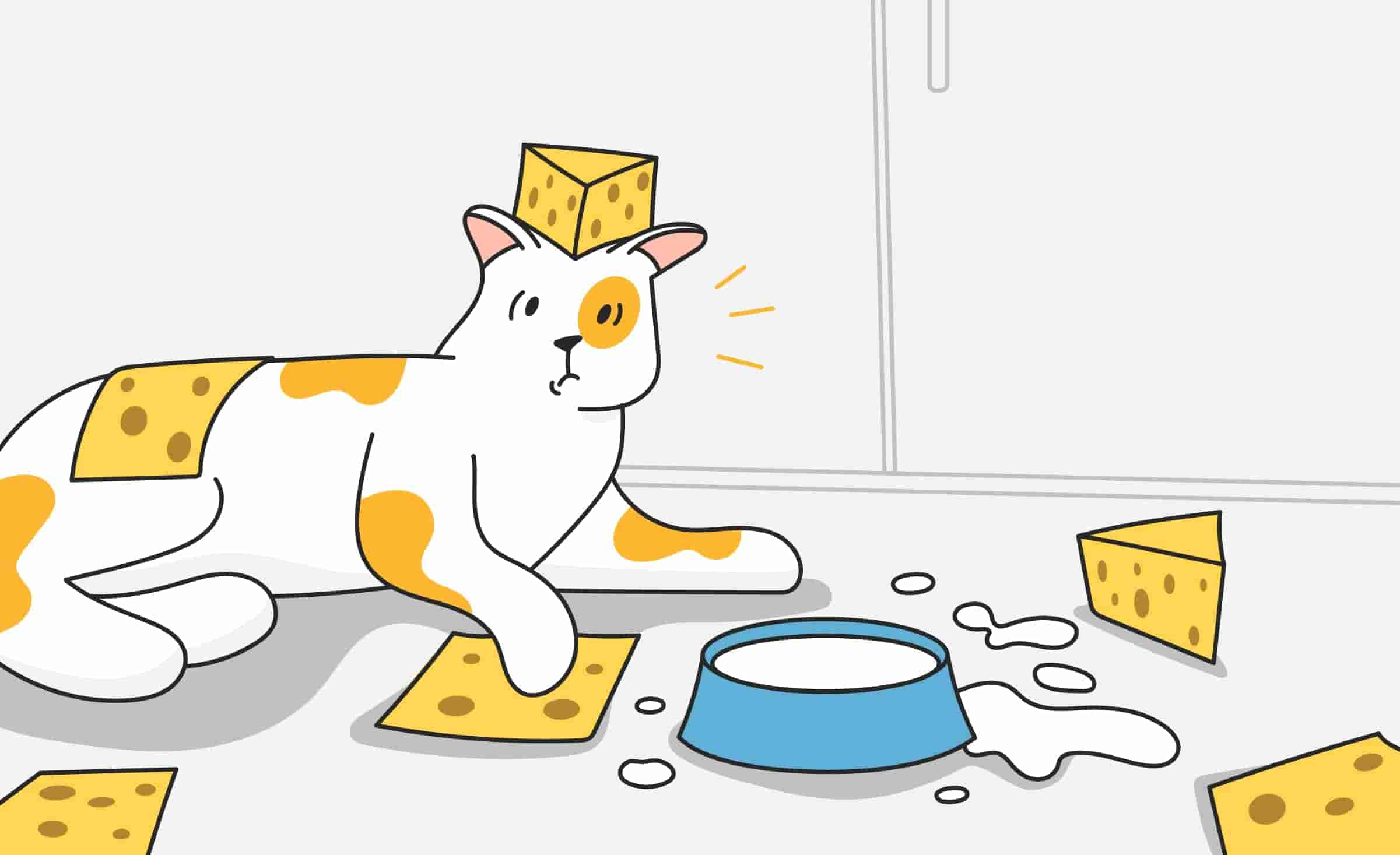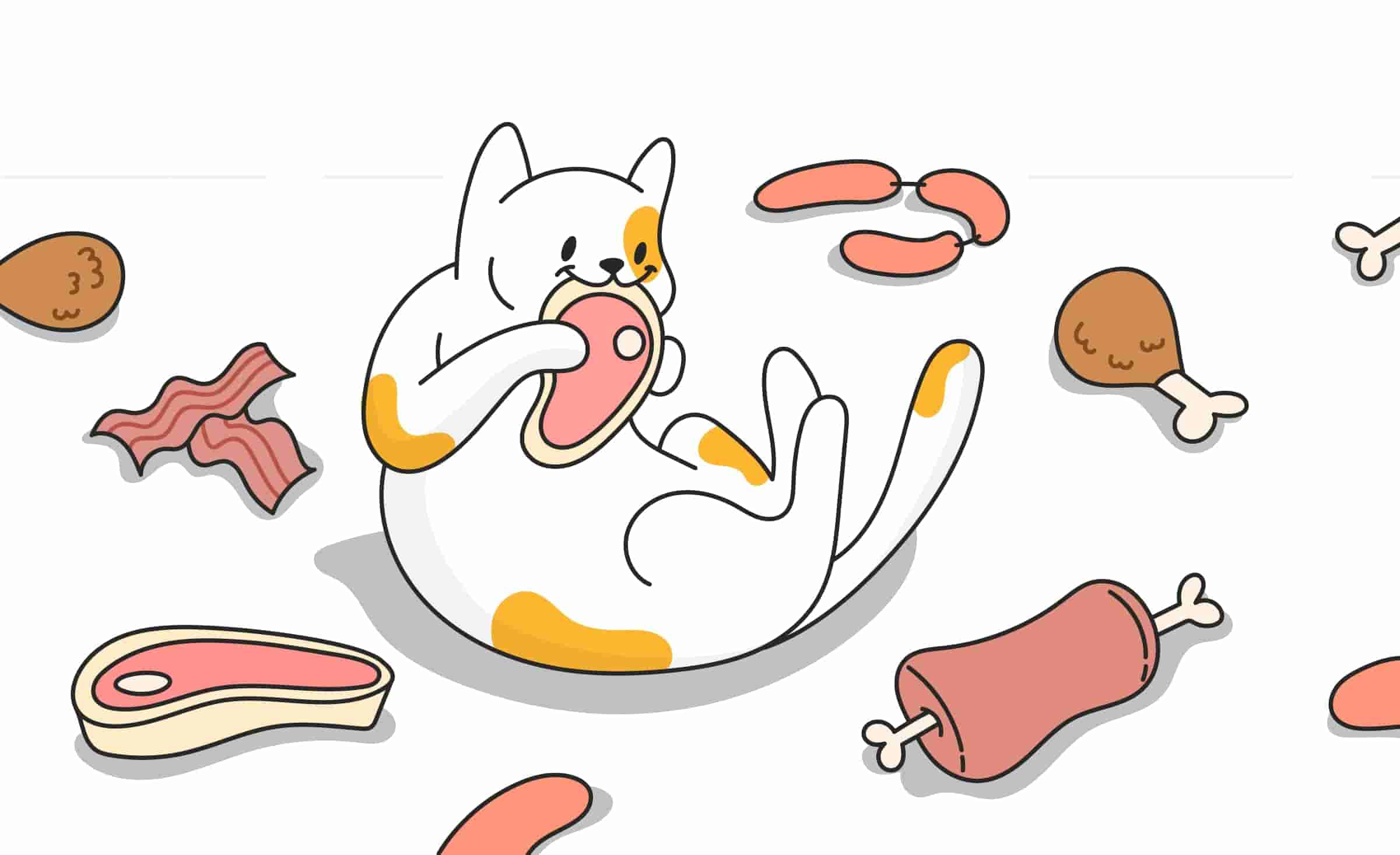With more people turning to plant-based and vegan diets, it’s natural to wonder which plant-based treats and vegan snacks are appropriate to share with your cat. Also, is it possible and reasonable to switch your cat to a vegan diet? Read on for more about cats and plant-based and vegan foods.
Stop Googling - Ask a Real Vet
Cats and plant-based milk
Ask any lactose-intolerant human, and they’ll tell you that the recent rise in the popularity of milk alternatives has changed the game for them. From soy milk to almond milk and everything in between, there are now a bunch of alternatives to cow’s milk — but are they safe for cats?
An important note on nut milk
Some nuts are potentially very dangerous for cats. As a cat owner, you should avoid macadamia nuts and macadamia nut milk since they can cause lethargy, vomiting, and tremors in your cat.
It’s best to keep all macadamia products away from your cat. Similarly, walnuts can be poisonous to cats because of their fungi, producing tremorgenic mycotoxins. Be aware that not all nuts are suitable for felines, much like some nut-based milk products.
Can cats drink oat milk
Oat milk is generally considered safe for your cat to consume in moderation. It won’t provide much in the way of nutrition for your cat, but there’s no need to panic if your cat manages to lick some up.
Some sound advice would be to check the ingredient label of your oat milk to make sure that it doesn’t contain too many additional ingredients. Too much sugar is not considered suitable to give your cat, whereas sweeteners like xylitol can cause liver diseases and blood clotting disorders.
While oat milk doesn’t contain any lactose, it might still not agree with your cat so keep an eye out for any signs of gastric upset. Just because oat milk isn’t bad for your cat doesn’t automatically make it good either.
Can cats have soy milk
Soy is a common ingredient in commercial pet foods. While it’s one of the most common allergens in dogs, there’s no evidence of the same being true for cats.
Generally, soy milk should be fine to give to your cat, but it’s important to check for other ingredients that may be harmful. Things like added sugar, flavorings, artificial sweeteners, and preservatives can cause other health issues in your cat.
Same as with dairy products, the biggest concern with adding soy milk to your cat’s diet is the fat content and additional calories, which can lead to weight gain over time.
Can cats drink rice milk
In the wild, rice isn’t commonly something that cats would eat. As a result, it’s not a food cats need to consume to be healthy. If your cat manages to sneak a few sips of your rice milk, it’s unlikely to cause any significant issues, but that doesn’t mean that it’s suitable for your cat either.
Rice milk is relatively high in carbohydrates and sugar. While research proves that felines don’t taste sweetness, your cat might still want to consume a product that contains sugar and sweeteners because of something else they taste. Not to mention that rice milk is high in calories and may lead to weight gain, potentially also causing a gastric upset in cats.
As your cat doesn’t need rice milk in its diet, there’s no need to go out of your way to include it.
Can cats drink almond milk
Almond milk is a trendy milk alternative for humans who can’t or don’t want to consume cow’s milk. But can cats have almond milk?
As cats don’t tend to consume nuts in the wild, there’s no reason for you to include almond milk in your cat’s diet. A small amount of almond milk for cats isn’t likely to do any harm, but the low protein content and high fat in almond milk won’t do your cat any good either.
Aside from the high calorie content, many brands of almond milk include additional ingredients such as flavorings, sugar, and artificial sweeteners, which are harmful to pets. All these facts don’t make cats and almond milk the best friends, but the occasional lick here and there won’t harm your kitty.
Can cats have coconut milk
Ok, this one isn’t technically a milk substitute, but it is a common ingredient in many modern kitchens. While coconut milk isn’t toxic for cats, it’s exceptionally high in fat and therefore calories. Plant proteins are generally tough on a cat’s digestive system, and coconuts are rich in them as well.
Small amounts of coconut milk as a rare treat may be okay, but the high fat content can cause gastric upset in some cats. Cats with known health issues like kidney or liver disease and diabetes should not be given such a high calorie treat.
As for coconut oil, it can be a good dietary supplement for felines in small doses. Because of its high fat content, abstain from giving your kitty too much coconut oil. Instead, share it as a rare treat or a supplement to enrich a well-rounded cat’s diet.
Can cats drink cashew milk
Like with almond milk, your cat will be fine if they consume a bit of cashew milk, but it should be kept to a minimum as the high fat content can cause weight gain when overconsumed.
Keep an eye on ingredient labels to make sure there are no preservatives, additives, and sweeteners that shouldn’t be given to cats.
Is a vegan diet healthy for cats?
Cats are obligate carnivores which means they need to eat meat to thrive. While it isn’t impossible, it is challenging to feed a cat a vegan diet and keep them healthy.
Meat contains specific amino acids like taurine that cats need to stay healthy. While humans and dogs can synthesize taurine, cats can’t, which means a vegan diet is likely to leave your cat with a deficiency. A taurine deficiency can cause some pretty scary heart problems in cats and can even be fatal.
There is a growing number of vegan cat foods on the market that have been fortified with taurine should you wish to try feeding your cat a vegan diet, but many veterinarians would caution that these foods still don’t offer your cat optimum nutrition.
Make sure to do your research and get your cat the best fortified vegan food you can afford. Your cat’s vegan diet will need to include taurine, protein, and vitamin A supplements.
Even though a study proves that cats have better protein digestibility while shifting from animal to plant sources, you still need to continuously adapt your cat’s diet in response to their health and well-being. It might be that your cat may need to revert to a meat-based diet if they are not doing well on a vegan one.
If you wish your cat to try a vegan diet, keep a close eye on them to make sure you address any health problems early on. Please always consult your veterinarian when making changes to your cat’s diet and keep an eye out for any signs that your cat may feel worse.
While some vegetables are known to be good for cats in moderation, It’s important to note that some are toxic for them. And in some cases, toxic ingestion may lead to pet emergencies, which can overwhelm us, pet owners. So what are the ways for us pet owners to protect our pets in cases of pet emergencies?
Petcube’s Pet Emergency Fund is an insurance alternative that cares for you and your pet in times of emergencies. First of all, it welcomes dogs and cats regardless of age, breed, and medical history. This is a game-changer since many insurance policies don’t cover senior pets or those with pre-existing conditions. Next is the yearly coverage. Pet Emergency Fund offers up to $3000 for pet emergencies for up to 6 pets. That way, you won’t have to worry about the costs involved in treating your pet in an emergency. They also pay the vet clinic directly so you won’t have to be pressured to settle the bill.
Not only that, they also have an online vet service that allows you to consult with certified vets 24/7 for first-aid guidance, emergency triage, and any concerns you may have about your pet. With a Pet Emergency Fund, you get the peace of mind that you need and more time to take care of your pet.
It surely is a good deal, but we’ll make it extra with an exclusive 27% off on subscriptions if you follow this link.
Cats and vegan “human” foods
Cats will beg for any morsel of whatever their humans are eating. If your jaws are moving, they expect you to share, and you’ll get no peace until you have done so. Find out whether you can safely share these popular vegan cat treats.
Can cats eat tofu
Let’s reiterate an important fact — felines are obligate carnivores. It means that the majority of their diet should consist of meat products. But what about tofu? Tofu is a popular ingredient in many meat substitutes and a popular addition in many vegan recipes. So, can cats have it too?
Tofu is not toxic or harmful to cats, so there’s no cause for alarm if your cat sneaks a piece. That said, it doesn’t fulfill their nutritional needs either. So, it’s not bad for them, but it isn’t good either. The worst that can happen is that it can cause a bout of diarrhea.
If your cat enjoys some tofu occasionally, make sure that it hasn’t been prepared with any other ingredients that aren’t suitable for cats, such as garlic or spices. Keep portions small and don’t make it a regular event.
Can cats eat soy
Aside from soy milk and tofu, other soy products should be relatively safe for cats. In fact, soy is a common ingredient in some commercial cat foods. It’s high in protein, vitamins, and minerals. Besides that, soybeans have antioxidant, antimicrobial, and anti-inflammatory properties for cats.
While soy is high in protein, it still does not offer your cat complete nutrition, so a diet based on soy will leave your cat with some deficiencies unless otherwise supplemented. But if you stick to soy protein supplements, you can actually diversify your cat’s meat-based diet. As specified by VCA Hospitals, pet owners can feed soy protein to their cats and dogs in the form of a supplement, which is believed to have all the beneficial properties of soybeans.
You might also wonder: can cats have soy sauce? The answer is no since soy sauce is too high in sodium, leading to dehydration. Say sauce is not a nutritional power for felines either, so when you have a sushi party, don’t feed your kitty soy sauce even when your pet begs so much.
Can cats eat hummus
Hummus is not something you should share with your feline companion. For starters, chickpeas are very hard for cats to digest. What’s more, chickpeas might also cause allergic reactions in some felines.
While the situation with chickpeas is more or less clear, can cats have hummus instead? When cooking this yummy dip, we mix chickpeas with oil, spices, herbs, salt, and garlic to make hummus more appetizing. Should we mention that all these ingredients are harmful to cats one way or another?
If your cat sneaks a lick, they should be fine (maybe still keep an eye out for any worrying symptoms), but over time and in large quantities, hummus can be very harmful to your cat.
Final thoughts on cats and vegan and plant-based food
Vegan and plant-based diets are growing in popularity among humans for various reasons, from health concerns to concerns about the environmental impact of the meat industry.
As more people choose this way of life, it’s normal to wonder what, if any, vegan and plant-based food items are safe to share with cats. Knowing which ‘human’ foods pose a health risk to cats is extremely important for all cat owners.
As for feeding cats an exclusively vegan diet, there are opposing viewpoints. Whatever you decide to do, make sure you approach your choice armed with as much information as you can from legitimate and varied sources. Work closely with your veterinarian to ensure that your cat receives all the nutrients required for a healthy life.
Not all cats will respond well to a vegan diet, and it may be that you could need to revert to a meat-based diet for your feline companion. Ensure you know what symptoms to look out for and take steps to correct any potential issues earlier rather than later.
Was this article helpful?
Help us make our articles even better










